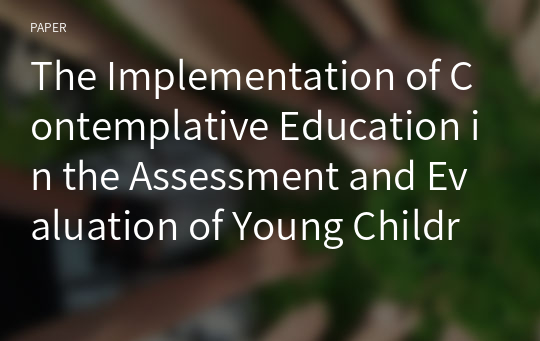The Implementation of Contemplative Education in the Assessment and Evaluation of Young Children Course
* 본 문서는 배포용으로 복사 및 편집이 불가합니다.
서지정보
ㆍ발행기관 : 환태평양유아교육연구학회
ㆍ수록지정보 : Asia-Pacific journal of research in early childhood education / 6권 / 2호
ㆍ저자명 : Sasilak Khayankij
ㆍ저자명 : Sasilak Khayankij
목차
IntroductionMethodology
Research findings
Discussion
Bibliography
한국어 초록
The purposes of this action research were to study the process of implementing contemplative education in the Assessment and Evaluation of Young Children course and to investigate students’ learning experiences in the awareness of self, others, and the profession. The research sample was 32 graduate students with a study duration of 16 weeks. Data was collected by using participatory observation, students’ journal writing and final examination, as well as focus group interviews. Data was verified throughout the study by means of peer review with co-lecturer and triangulation in multiple data collection and then analyzed using content analysis. The research findings revealed that there were three main steps in implementing contemplative education as follows: 1) Planning: Course curriculum wasdesigned based on contemplative education which comprised of four main components, namely (1) the course concepts focusing on three aspects of knowledge, (2) the course structure focusing on three contemplative education practices, (3) the course contents composed of early childhood assessment integrated with contemplative education,and (4) learning activities emphasizing three modes of learning. 2) Action: Lesson plans were designed. Then six steps of instruction were carried out, namely (1) setting the stage of serenity for learning readiness, (2) practicing the creation process through artistic work, (3) practicing contemplative observation, (4) learning the concepts of assessment, (5) sharing space through dialogue, and (6) self-reflection through journal writing. Finally, lesson planswere reviewed and adjusted. 3) Evaluation: Students’ knowledge and competency in applying concepts of assessment and contemplative education were gathered and evaluated. After implementation, students reflected on their learning experiences as follows: (1) Awareness of self: Students’ reflection showed evidence of clearer self-understanding, open-mindedness, self-appreciation, self-improvement, careful observation, optimism and happiness, being nonjudgmental and effectively learning. (2) Awareness of others: Students’ reflection showed evidence of understanding and acceptance of others, viewing things as they were, having sympathy for others, and valuing others. (3) Awareness of the profession: Students’ reflection showed evidence of understanding children as they were, teaching in accordance with the nature of children, being aware of oneself, self-improving, caring for children, and valuing theteaching profession.영어 초록
The purposes of this action research were to study the process of implementing contemplative education in the Assessment and Evaluation of Young Children course and to investigate students’ learning experiences in the awareness of self, others, and the profession. The research sample was 32 graduate students with a study duration of 16 weeks. Data was collected by using participatory observation, students’ journal writing and final examination, as well as focus group interviews. Data was verified throughout the study by means of peer review with co-lecturer and triangulation in multiple data collection and then analyzed using content analysis. The research findings revealed that there were three main steps in implementing contemplative education as follows: 1) Planning: Course curriculum wasdesigned based on contemplative education which comprised of four main components, namely (1) the course concepts focusing on three aspects of knowledge, (2) the course structure focusing on three contemplative education practices, (3) the course contents composed of early childhood assessment integrated with contemplative education,
and (4) learning activities emphasizing three modes of learning. 2) Action: Lesson plans were designed. Then six steps of instruction were carried out, namely (1) setting the stage of serenity for learning readiness, (2) practicing the creation process through artistic work, (3) practicing contemplative observation, (4) learning the concepts of assessment, (5) sharing space through dialogue, and (6) self-reflection through journal writing. Finally, lesson plans
were reviewed and adjusted. 3) Evaluation: Students’ knowledge and competency in applying concepts of assessment and contemplative education were gathered and evaluated. After implementation, students reflected on their learning experiences as follows: (1) Awareness of self: Students’ reflection showed evidence of clearer self-understanding, open-mindedness, self-appreciation, self-improvement, careful observation, optimism and happiness, being nonjudgmental and effectively learning. (2) Awareness of others: Students’ reflection showed evidence of understanding and acceptance of others, viewing things as they were, having sympathy for others, and valuing others. (3) Awareness of the profession: Students’ reflection showed evidence of understanding children as they were, teaching in accordance with the nature of children, being aware of oneself, self-improving, caring for children, and valuing the
teaching profession.
참고 자료
없음"Asia-Pacific journal of research in early childhood education"의 다른 논문
 Towards a Reflexive Pedagogy in Early Childhood Educati..15페이지
Towards a Reflexive Pedagogy in Early Childhood Educati..15페이지 Social Relationships and Creative Thinking in Early Chi..18페이지
Social Relationships and Creative Thinking in Early Chi..18페이지 The Balanced Language Approach Program Based on Hangeul..22페이지
The Balanced Language Approach Program Based on Hangeul..22페이지 Examining the Quality of Part-Day and Full-Day Kinderga..27페이지
Examining the Quality of Part-Day and Full-Day Kinderga..27페이지 Implementation Challenges of Inclusive Education: A Rev..14페이지
Implementation Challenges of Inclusive Education: A Rev..14페이지




















